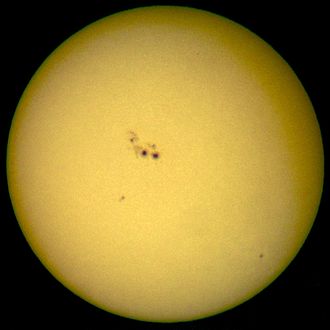m (+ translate tags) |
m (- Category of AYHAB) |
||
| (2 intermediate revisions by the same user not shown) | |||
| Line 1: | Line 1: | ||
| − | <noinclude><translate></noinclude> | + | <noinclude><translate><!--T:1--> |
| + | </noinclude> | ||
[[image:Sun projection with spotting-scope large.jpg|thumb|The Sun with sunspots]] | [[image:Sun projection with spotting-scope large.jpg|thumb|The Sun with sunspots]] | ||
A sunspot is a region on the Sun's surface that is marked by a lower temperature than its surroundings and intense magnetic activity, forming areas of low surface temperature. Although they are blindingly bright, at temperatures of roughly 4000-4500° K, the contrast with the surrounding material at some 5700° K leaves them clearly visible as dark spots. If they were isolated from the surrounding photosphere they would be brighter than an electric arc. | A sunspot is a region on the Sun's surface that is marked by a lower temperature than its surroundings and intense magnetic activity, forming areas of low surface temperature. Although they are blindingly bright, at temperatures of roughly 4000-4500° K, the contrast with the surrounding material at some 5700° K leaves them clearly visible as dark spots. If they were isolated from the surrounding photosphere they would be brighter than an electric arc. | ||
<br style="clear:both"/> | <br style="clear:both"/> | ||
<noinclude></translate></noinclude> | <noinclude></translate></noinclude> | ||
| − | |||
Latest revision as of 00:10, 15 July 2022
A sunspot is a region on the Sun's surface that is marked by a lower temperature than its surroundings and intense magnetic activity, forming areas of low surface temperature. Although they are blindingly bright, at temperatures of roughly 4000-4500° K, the contrast with the surrounding material at some 5700° K leaves them clearly visible as dark spots. If they were isolated from the surrounding photosphere they would be brighter than an electric arc.

